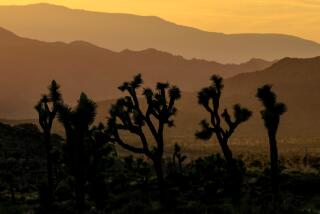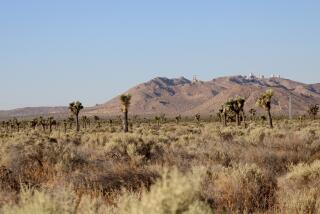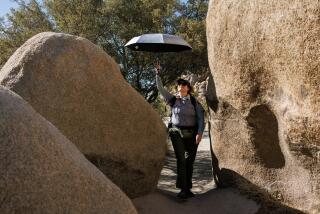Meet the paraplegic rock climber keeping Joshua Tree National Park clean during shutdown
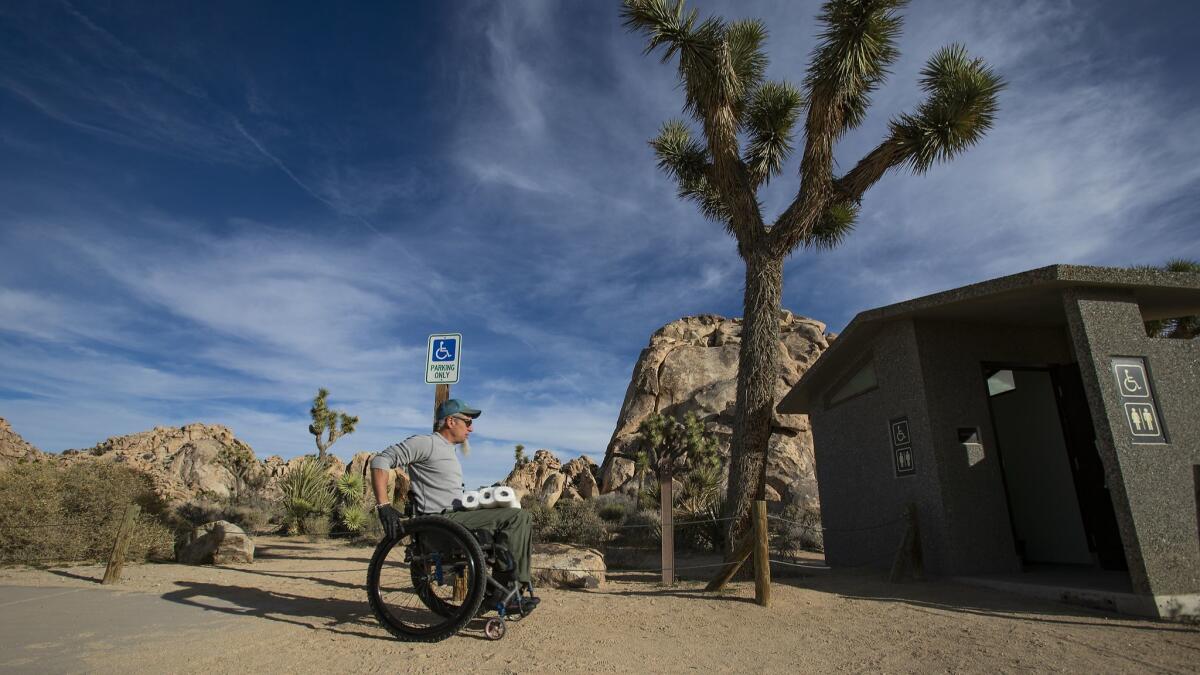
In this high desert enclave, Rand Abbott is a well-known man of action. He’s a paraplegic rock climber; a vocal lightning rod at town hall meetings; and a tireless promoter for the desert landscape and its resident creatures.
So it came as little surprise to friends two weeks ago when he volunteered to clean restrooms and remove trash that was littering Joshua Tree National Park due to a partial government shutdown over funding for President Trump’s border wall.
For the record:
6:40 p.m. Jan. 9, 2019An earlier version of this article misspelled the first name of Gayle Austin, a Joshua Tree resident and co-owner of Ink & Steel Tattoo, as Gale.An earlier version of this article included a photo which incorrectly identified a Joshua tree as having been cut down by vandals during that time. Although a park ranger initially identified the tree as part of the vandalism, park officials now say the tree was downed as a result of wind damage.An earlier version of this article included a photo showing a vandalized rock. The graffiti was first reported on the rock in October and has since been removed.
Unfortunately, the park was in far more disarray than a one-man army could handle.
Amid reports of plundered Native American artifacts and chain-sawed Joshua trees, officials announced they would close the park entirely at 8 a.m. Thursday — the 20th day of the government shutdown. The closure, they said, would allow them to assess damage to the park and mount an intensive cleanup effort.
But then, hours before the shutdown was to occur, the National Park Service released a statement late Wednesday saying officials had averted the closure “by immediately utilizing revenue generated by recreation fees.” The funds will allow park maintenance crews to address sanitation issues, the statement said.
While Joshua Tree is famous for its otherworldly landscape of weather-beaten rocks and spindly, namesake trees, unruly visitors have turned it into a worst-case example of parkland abuse, officials say.
With no rangers in sight for roughly three weeks, visitors have fought over official campsites and driven through off-limit areas to create illegal encampments. They have littered, set illegal fires, defecated in the wild, and chopped down vegetation to drive around barriers intended to keep people out of sensitive wildlife corridors.
Abbott, one of dozens of ardent volunteers helping out in the park, figures he’s spent nearly $5,000 on bleach, rags and garbage bags and driven 702 miles while cleaning overflowing toilets, picking up garbage and documenting the mess from his wheelchair.
The 55-year-old said that last Sunday, he confronted a group that had used a chain saw to cut up a Joshua tree and a pine tree for firewood. In a separate incident, he cautioned a man who had illegally parked a pickup truck and trailer in a rocky cove frequented by bighorn sheep.
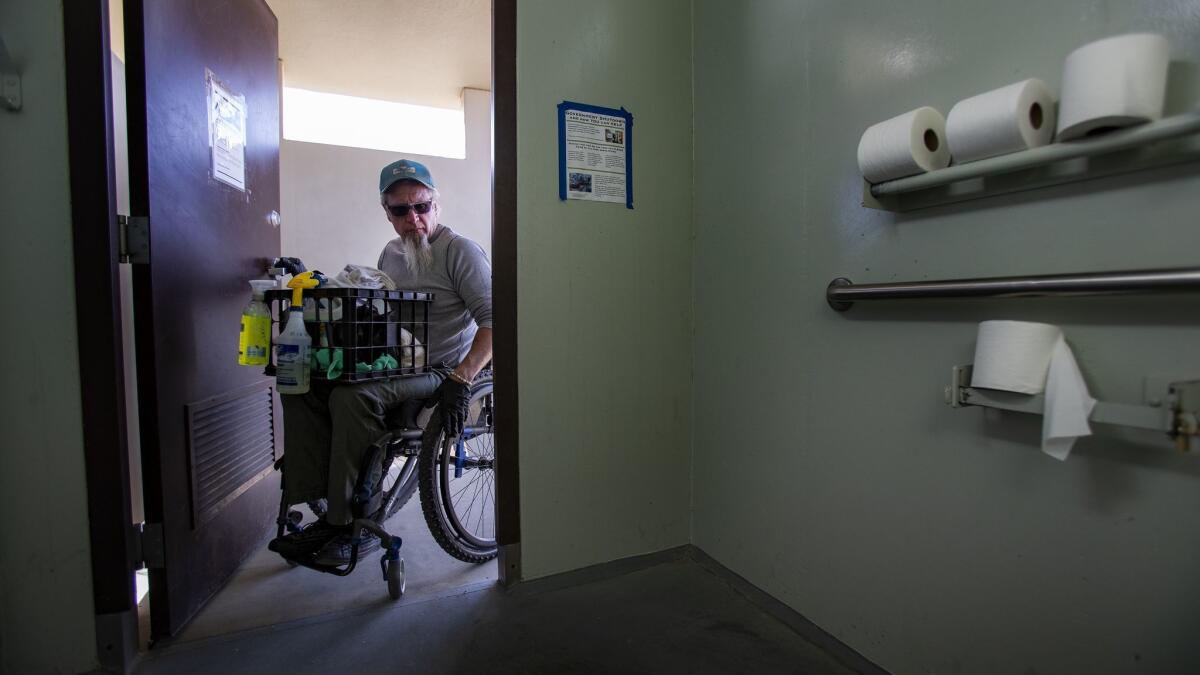
“That guy was casually brushing teeth when I pointed out that he’d run over and crushed creosote and cactus,” Abbott recalled. “He just flipped me off.”
Then, a mile up the road, Abbott said he spotted “a pile of beer bottles beside a rock facing the highway that someone had desecrated with graffiti.”
Environmental and community groups say the conditions have reached a point of crisis.
“Given what’s been going on, I’m still not sure what’s actually best for the park we all cherish — closure or reopening it,” said Gayle Austin, a Joshua Tree resident and co-owner of Ink & Steel Tattoo. “It’s hard not to think we’re just pawns in a political chess game.”
On Tuesday, David Smith, superintendent of the 800,000-acre park, telephoned the leaders of local volunteer groups to inform them of the closure.
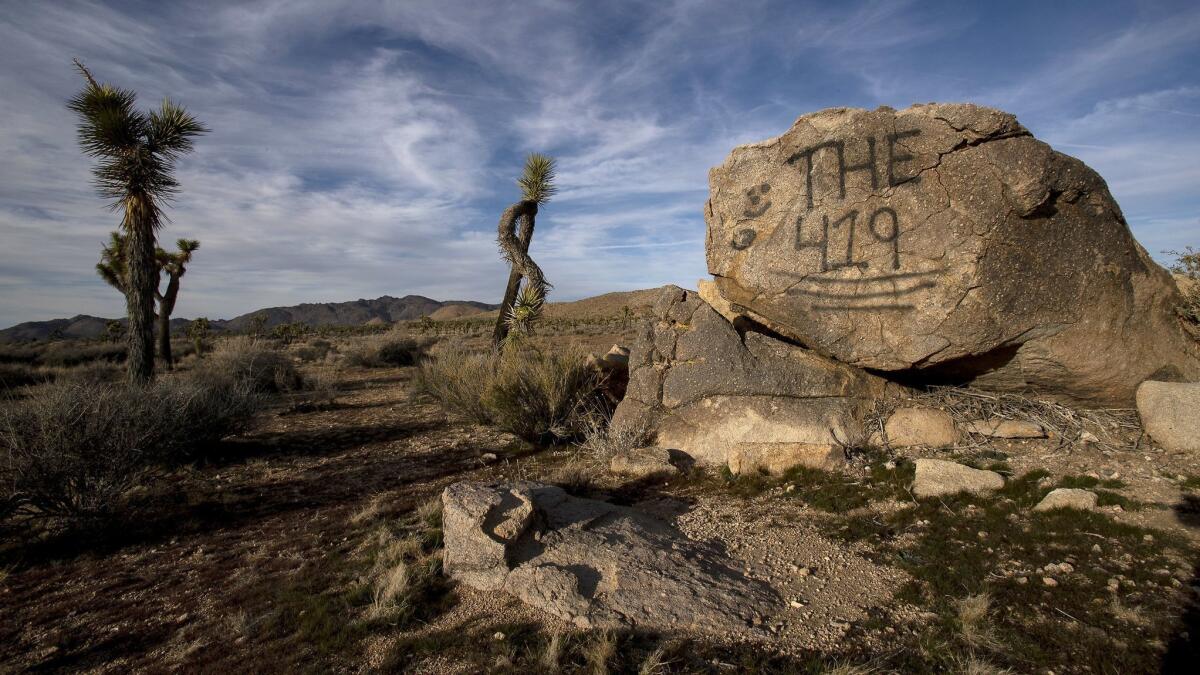
“Due to significant resource destruction, aggressive defiance and flagrant acts over the past week, the park is in jeopardy of being permanently damaged,” Smith said in a message left on Abbott’s phone. “So, we’re going to shut it down and lock it up at 8 a.m. on Thursday.”
“It brought tears to my eyes,” Abbott said of the message.
The park lures roughly 3 million visitors a year, and the local economy is heavily reliant on these tourists.
The sleepy, unincorporated high desert community of Joshua Tree has a population of about 9,000 and an estimated 800 unlicensed vacation rental businesses offering alternatives to traditional lodging: neighborhood homes, vintage trailers, Sherpa huts, tepees, shipping containers and camps where guests are encouraged to let their dogs run free while they sip cocktails and watch the sunset.
By noon on Tuesday, many small-business owners were making plans to adjust by reducing work hours. Owners of vacation rentals began calling prospective clients who had made reservations. Local hotels posted signs in their lobbies informing guests of the impending closure.
Displays of American flags hung upside down had already triggered heated arguments over whether that symbol of dire distress was appropriate for this community of low-slung motels and artist enclaves.
Tom O’Key, a local activist and astronomer, put it this way: “There needs to be a Constitutional amendment protecting our cherished public landscapes. Because right now, the worst among us are trampling the best we’ve got.”
Abbott, a veteran who was once stationed at the U.S. Marine base in nearby Twentynine Palms, said he welcomed news that the park would conduct an official cleanup.
But he said he’ll always feel the weight of protecting the national park and the economy built around it.
At a popular destination known as Lost Horse Campground, Abbott reached out with his arms as if to embrace the stark scenery.
“When I was in the Marines, the others guys took leave in Las Vegas or the Sunset Strip,” he recalled with a smile. “I’d come here, toss a sleeping bag down and stare at the Milky Way, which seemed so close I could reach up and scoop up stars.”
More to Read
Sign up for Essential California
The most important California stories and recommendations in your inbox every morning.
You may occasionally receive promotional content from the Los Angeles Times.
